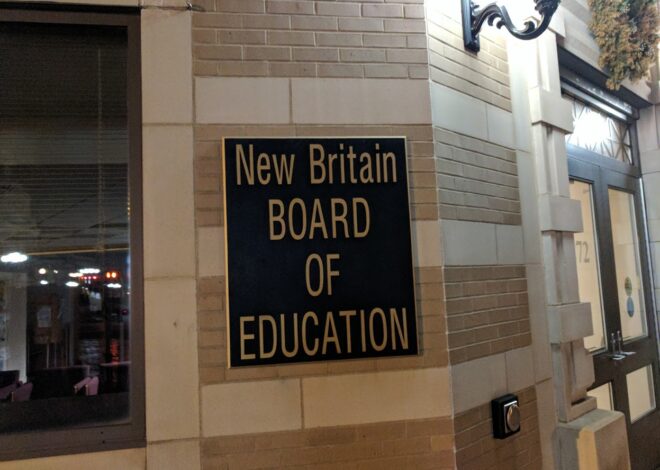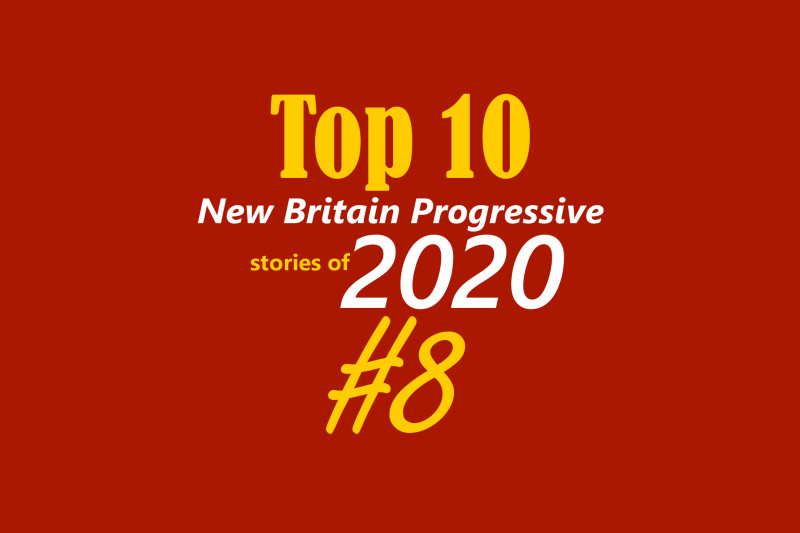
Top 10 of 2020: #8 – Stewart Freezes Education – Yet Again
The New Britain Progressive covered a lot of major news in New Britain during 2020 – much more than just ten top stories. As the New Britain Progressive now presents our traditional Top Ten stories of the year, it is truer now than in the past that it is difficult to name only a few articles as the top among a great deal of important news. But here are a few, in this year’s annual series, that the New Britain Progressive would like to share as our Top Ten. Other Top Ten stories can be found at “Top Ten Stories of 2020.”
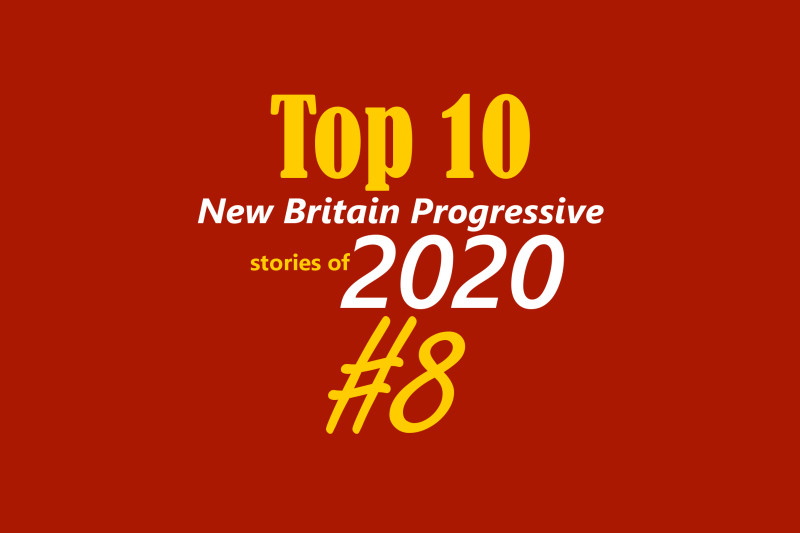
That Republican Mayor Erin Stewart would freeze the level of city support for New Britain’s schools is nothing new, in spite of a connection that has appeared to be present between a city or town’s commitment to its own local schools and academic success, as measured by test scores. Stewart has a history of sizable increases in City Hall spending, while providing a pittance to the operating budget of New Britain’s schools
Still, once again, Stewart proposed a city budget in 2020 that froze the level of local funding for the operation of New Britain’s schools. (“Stewart Budget Freezes Education Again“). And, while Stewart claimed that her 2020-2021 budget decreased spending in the rest of the city budget, that claim appeared questionable – based on a curious fund transfer that apparently masked a real $3 million increase in city spending. (“Spending in Stewart Budget Appears to Increase Without Medical Self-Insurance Cut“.)
Still, the Republican controlled City Council approved Stewart’s budget, (“Council Approves Stewart Budget 9 – 5“.) And then proceeded to approve yet another Stewart proposal to add to the city’s debt in order to cover deficits in Stewart’s annual budgets. (“City Considers Adding $30 Million Debt to Cover Deficits“.) That $30 million more would be on top of tens of millions added to New Britain taxpayer debt to cover Stewart’s deficits from previous years.
However, while freezing support for New Britain’s local schools, Stewart and her Republican-controlled City Council did find sufficient funds to increase the mayoral salary by 13% to $99,407. (“Mayor’s Salary to be $99,407 After 13% Raise“.)
While a recurring theme, this low support for New Britain’s schools is a big problem for New Britain’s future, and so was one of the New Britain Progressive‘s Top Ten Stories of 2020.
Stewart Budget Freezes Education Again
April 25, 2020
Republican Mayor Erin Stewart’s proposed budget for New Britain in the upcoming budget year apparently freezes city operating funding for schools again.
Stewart has proposed that the city operating allocation to New Britain schools, called the, “BOE Appropriation Rollup,” in the city budget, should receive $0 of new funding in the city budget year that starts July 1, 2020 and ends on June 30, 2021. It is presently funded at $125,700,000.

City education funding, the amount of money that the city allocates from local taxes to fund the regular annual budget of the city’s schools, has become a significant issue for New Britain.
As, the New Britain Progressive has reported, the low amount of education funding provided by the city government appears to be correlated with low student academic test scores in New Britain.
Stewart has been criticized for the low city commitment to funding for the operation of the city’s schools, repeatedly freezing the amount of money that the city allocates locally to its schools, despite millions of dollars in increases in funding for City Hall departments.
Last year, Stewart did propose, and the Council approved, a transfer to the school system of the money from a grant that the state provides to the city to support special education. That special education grant averaged be $3.3 million between the 2016 and 2019 budget years. That money, being passed on the school system, was the single largest increase in annual operating education funding Stewart has provided to city schools in her seven years as mayor. But that budgetary slight-of-hand was a one-shot boost to the schools’ budget, only providing a real increase in the budget approved last year.
Even with the increase last year, Stewart’s budgets to have only increased city funding for New Britain schools’ operating budgets by an average of less than 0.7% per year.
The New Britain Progressive reported in 2019 that, despite New Britain receiving, “the fifth highest state Education Cost Sharing grant funding of all of the cities and towns in the state,”
New Britain’s own local commitment to education, on the other hand, is among the lowest municipal school districts in the state. Only Bridgeport allocated less local funding per student than New Britain in the 2015-2016 state data.
While New Britain residents have less money than the state average to fund local services, the New Britain Progressive reported that, even looking at a percent of the city’s ability to pay, the city of New Britain still appeared to allocate to its schools, “the second lowest among municipal school districts in the state.”
The New Britain Progressive also reported that,
Comparing the amount of local support for education, using the 2015-2016 data, to the most recent academic test scores appears to show a general correlation between how much a city or town provides in local funding for their schools and the test scores of the students in their schools. The comparison appears to show New Britain’s place near the bottom of both local education funding and test scores as part of a larger pattern, with New Britain near the low end of the scale.
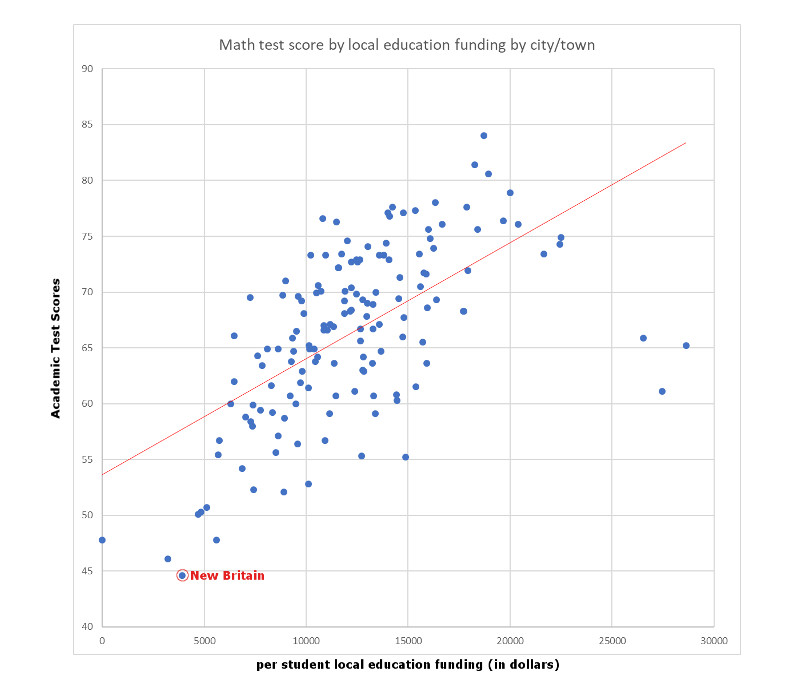
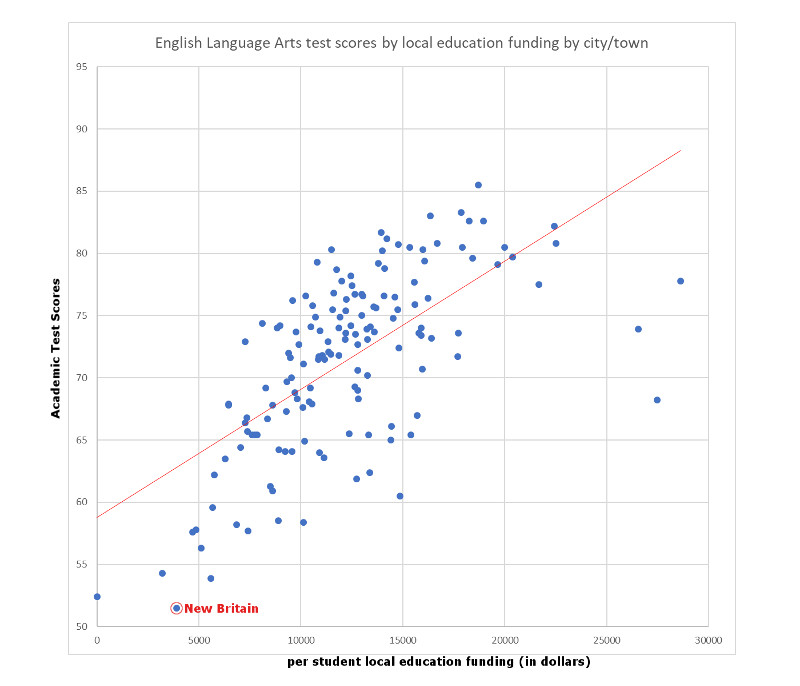
The New Britain Progressive reported that it would appear to take a $14 million per year increase from the city to get the city up to the average amount cities and towns spent as a portion of their local ability to pay four years ago, apparently leaving New Britain’s city commitment to annual school operating budgets far behind the benchmarks that appear correlated with higher educational outcomes.
The state Educational Cost Sharing Grant funding for New Britain schools was increased by the state legislature by $3,865,021 for the 2019-20 budget year.



